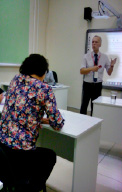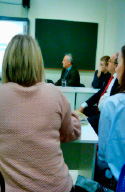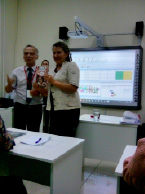Every day people use thousand words in their speech and they don`t pay attention to the grammar category of the words. Meantime speakers use different parts of speech to make their sentences more expressive and clear: nouns, verbs, adjectives, adverbs, pronouns, prepositions, conjunctions, interjections. When we study English we have to study all the parts of speech too. When you learn a foreign language it is very important to constantly replenish your vocabulary – to remember new words in English. However, not everyone is able to do it successfully. Learning a language is impossible without memorizing new words. It is also an inevitable thing when we are busy preparing to take an exam in English. So far as we are often pressed for time we need to learn a lot of words in a short time. We decided to find out what are the most effective methods to learn a new vocabulary. This fact determines the relevance of the question.
The object of the exploration is learning foreign words.
The subject of the work is a set of methods of learning new words.
The aim of the research is to find out the most effective way to memorize English words.
The following tasks were set:
1. to study the concept of memory;
2. to study the usual ways to learn words by heart;
3. to reveal the most popular way of learning with the students from the school №7;
4. to reveal a University teacher`s opinion ;
5. to present a video “ 5 ways to learn English words” .
Hypothesis: we assume that there is one method, which let us to study effectively.
Methods of the research work: theoretical analysis, surveys, observation.
The theoretical significance consists in generalization of the material on this topic.
The practical significance: the results can be used in English lessons and learning English in general.
1. Learning words as a mental process
1.1. Characteristics of Memory
Memory is an integrated mental reflection of the past human interaction with reality, the information fund of his life. The main property of the brain is the ability to store information and selectively update it, use it to regulate behavior. It provides the interaction of the individual with the environment. Memory integrates life experience, provides continuous development of human culture and individual life. On the basis of memory a person is guided in the present and anticipates the future [7, c.146].
Depending on the characteristics of the memorized material, there are special ways of its codification, archiving and extraction. The spatial organization of the environment is encoded in the form of schematic formations of semantic reference points that characterize our physical and social environment.
Consistently advancing phenomena are imprinted in the linear structures of memory. Formally organized structures are imprinted by associative mechanisms of memory, providing grouping of phenomena and objects on certain grounds. All meanings are categorized and refer to different groups of concepts that are in hierarchical interdependence [7, c.435].
The possibility of a rapid updating, extraction depends on the organization of the material in the memory. The information is reproduced in the context in which it was originally formed.
Many people complain of a bad memory, but they do not complain of a bad mind. Meanwhile, the mind, the ability to make relationships is the basic things of the memory.
Extraction of the learnt material from memory to use it, remembering, and recollection is called actualization. The necessary material we are looking for in the memory in the same way as the necessary thing in the pantry: the items in the neighborhood. Figuratively speaking, in the Fund of our memory everything is hung «on the hooks» of associations. The secret of a good memory is in establishing strong associations. That is why people remember best what is associated with their everyday concerns, professional interests. Encyclopedic erudition in one area of life can be combined with ignorance in other areas. Some facts are held up in our minds by the power of other well-known facts. Mechanical cramming is the most ineffective way of memorizing [14].
1.2. Usual ways to learn words by heart
There are several traditional methods of memorizing new words and expressions. Some of them are often used by students, but the most part of these methods are forgotten. We chose five of them.
Yartsev Method. This way is perfect for pupils who are visuals and can easily remember images. They write down new words in small notebooks with the translations. They add examples, synonyms, and antonyms opposite each word. It is necessary to read them regularly and add other new words but not to try to cram.
Cards. This method is popular enough. It is very effective at the beginning of the study. Small cards are used. They have an English word on one side and its translation on the other side. A student should read them time after time.
Half a page. It look likes a dictionary. The main drawback of the method is considered to be the memorization of a certain order, which is very difficult to unlearn.
Interior. They put stickers with foreign names on each piece of furniture. Names will always be in front of the eyes, it will be easier to remember. The only drawback is that over time the brain will learn to ignore stickers.
Chain. They make a little story from the words that they want to learn. It enables to remember not a few words, but sentences. Most teachers prefer to use these methods because creativity can turn it into an exciting, interesting activity that helps to learn faster [9].
Conclusions
We studied the material on this topic. So we can make a conclusion that the human memory is a complex thing. It also has got a great possibility to be developed. A person can achieve wonderful results if he trains hard memory.
A lot of traditional methods of learning a new vocabulary exist. We considered some of them.
At the next stage of our work we will reveal the most popular ways of memorizing new words with the students from school №7. We will try different unusual methods and choose the most effective ones.
2. Unusual methods to learn English words
In the practical part of the researching work we followed the plan:
Consideration of methods used by students from school №7 to memorize the vocabulary.
Interview a University teacher.
Experience of trying unusual methods.
Making the video «5 ways to learn English words».
2.1 Methods used by students from school №7 to memorize the vocabulary
The next stage of our work was to carry out a survey among the students of the 9th form in order to determine their favorite methods of learning words. We proposed five traditional methods: Yartsev method, cards, half a page method, interior and the method with a chain. They had to memorize 20 words during a day. We worked with 100 students. It was revealed that the most of the pupils are visuals. That`s why they prefer using cards and half a page methods. It makes 30 % and 45% correspondingly. Yartsev method has got 11%. 9% of respondents chose the way using a chain and 5% tried the interior method. The result of the survey is presented in a diagram. (Appendix 1).
2.2 The University teacher`s recommendations
On the 4th of November we interviewed Gusel Salavatovna Sadrieva who works as a university lecturer at Department of Translation and Cross-cultural Issues, M. Akmullah Bashkir State Pedagogical University. We asked her about the importance of learning new words among students of the Department of Translation and Cross-cultural Issues. She explained us that being an English teacher at university and dealing with freshmen and sophomores, whose majors are Linguistics and English, and the program itself was dedicated to translation and translation science, it was safe to say that expanding vocabulary and even its upgrading was the essential idea in foreign language studying. She added that there were a lot ways and methods both for students and teachers. Gusel Salavatovna tries to combine them in order to get a result. She named the most popular among them:
Using different flashcards (digital via different gadgets);
Learning new vocabulary in context (the second, the third, etc. … foreign languages are learnt in the same way);
Studying word parts in order to be ready to form a new word or even to predict the main idea of the unfamiliar word for you when it is necessary;
Working on mnemonics to keep in mind a huge amount of words;
Making your brain work hard all time solving different puzzles or logical tasks;
Keeping a dictionary (it’s a great thing for school students and even for freshmen to review the vocabulary before writing tests or passing credits);
Using the vocabulary in practice.
At the end of the interview she said that only practice makes perfect. (Appendix 2).
2.3. Practical relevance of the methods
At this stage of the work we presented our own experience of memorizing new vocabulary. We started with watching movies. We decided to do it because it is more fun than studying with a textbook. We realized that books are good for grammar and watching British and American films gives a chance to listen to native speakers. There are a lot of interesting dialogues in films. They provide examples of words changing in speech [21].
We consulted some sites and chose three films: an animated cartoon “Toy Story”, “The King`s speech”, “The Theory of everything”. After watching them we concluded that animated cartoons are the best things for beginners as they are for children and the vocabulary isn`t difficult. The second one is good to improve our pronunciation, because they speak correctly during the film. The characters of the third film have clear British accents as the story takes place at Cambridge University. (Appendix 3 ).
We also took a part in the international scientific and practical seminar, which was set at the linguistic school on the 3rd of November. There were several teachers from M. Akmullah Bashkir State Pedagogical University and a young teacher from the USA, Sean Hall. He told us about online language learning (OLL). We learnt a lot of useful information from his speech. He named some sites which can also be used to improve our skills: italki, duolingo. (Appendix 4).
Italki is the most preferred platform for learning foreign languages, bringing together students and teachers from all over the world, where you can take individual lessons. It gives a great possibility to talk to native speakers.
Duolingo is for Basic English. (Appendix 5).
2.4. The video «5 ways to learn English words»
As the result of the researching work we have made a video. It contains some advice for students who are interested in expanding their vocabulary and improving their language skills.
Conclusions
After completing the practical part of the work we can make a conclusion that there is a great number of methods of learning words.
After analyzing the results of the survey, we came to the conclusion that most students have a predominant visual memory and use traditional «cramming» to memorize English words. Only some students replied that when memorizing new words they use the method of «stickers», play games with their parents and learn words in a playful way.
Conclusion
The aim of our research was to identify and suggest the most effective methods of memorizing English words for students.
In the theoretical part we got acquainted with the literature on the subject and found out that the human memory is a complex thing. It also has got a great possibility to be developed. A person can achieve wonderful results if he trains hard memory.
In the practical part of our work we conducted a survey among the students and got a result which proved that the most of the pupils were visuals. They learn words using traditional methods.
We talked to Gusel Salavatovna Sadrieva who works as a university lecturer at Department of Translation and Cross-cultural Issues, M. Akmullah Bashkir State Pedagogical University. She gave us some recommendations based upon her experience.
We practiced some unusual ways of learning new words and it was a great pleasure. We liked watching movies in original most of all.
After the study, our hypothesis was not fully confirmed: there are really a large number of interesting and effective methods of learning English words, but everyone should choose the ones that suit him, given the type of his memory. Moreover, you should to repeat and revise the words systematically to fix them in memory. Whichever method you choose, success will depend only on your desire and perseverance. The best way to learn English words correctly is to learn them with pleasure!
Thesaurus
Actualization – making real or giving the appearance of reality.
Codification – an arrangement of laws, principles, facts etc in a system.
Cram – to prepare yourself for an examination by learning a lot of information quickly.
Extraction- the process of removing or obtaining something from something else.
Freshman – a student in the first year of high school or university.
Interaction – a process by which two or more things affect each other.
Hierarchical – if a system, organization etc is hierarchical, people or things are divided into levels of importance.
Memory – 1. The mental faculty of retaining and recalling past experience.
2. The act or an instance of remembering; recollection.
3. All that a person can remember.
4. Something that is remembered.
5. The fact of being remembered; remembrance.
6. The period of time covered by the remembrance or recollection of a person or group of persons.
Reflection – 1. An image that you can see in a mirror, glass, or water.
2. Careful thought, or an idea or opinion based on this.
3. Something that shows what something else is like or that is a sign of a particular situation.
Sophomore – a student who is in their second year of study at a college or high school.
Appendix 1
Methods used by students from school №7 t o memorize the vocabulary

Appendix 2
A University teacher`s recommendations
Being an English teacher at university and dealing with freshmen and sophomores, whose majors are Linguistics and English, and the program itself is dedicated to Translation and translation science, it is safe to say that expanding vocabulary and even its upgrading is the essential idea in foreign language studying. There are a lot ways and methods… where there’s a will there’s a way, both for students and teachers.
As for me, I try to combine them in order to get a result. Most popular among them are following. They are:
• Use different flashcards (digital via different gadgets, DIY paper);
• Learn new vocabulary in context (the second, the third, etc. … foreign languages are learnt in the same way);
• Study word parts in order to be ready to form a new word or even to predict the main idea of the unfamiliar word for you when it is necessary;
• Work on mnemonics to keep in mind a huge amount of words;
• Make your brain work hard all time solving different puzzles or logical tasks;
• Keep a dictionary (it’s a great thing for school students and even for freshmen to review the vocabulary before writing tests or passing credits);
• Use the vocabulary in practice as only PRACTICE MAKES PERFECT.
Gusel Sadrieva
University Lecturer
Department of Translation and Cross-cultural Issues,
M. Akmullah Bashkir State Pedagogical University
Appendix 3
Top 10 best films to learn English
1. “A toy story” (1995)
2. “The King`s speech” (2010)
3. “Harry Potter” (2001–2011)
4. “The Shawshank Redemption” (1994)
5. “Love Actually” (2003)
6. “Forrest Gump” (1994)
7. “The Theory of Everything” (2014)
8. “Alone” (2014) – a short film
9. “The Queen” (2006)
10. “Jurassic Park” (1993)
The dialogue from the film “The King`s speech”
King George VI: Listen to me. Listen to me! Lionel Logue: Listen to you? By what right? King George VI: By divine right, if you must. I am your King. Lionel Logue: No you’re not. You told me so yourself. You said you didn’t want it. Why should I waste my time listening? King George VI: Because I have a right to be heard! I have a voice! Lionel Logue: Yes, you do. You have such perseverance, Bertie. You’re the bravest man I know. You’ll make a bloody good King.
Appendix 4
The international scientific and practical seminar



Appendix 5


Библиографическая ссылка
Хайров А.Н. DO YOU STUDY EFFECTIVELY OR FIVE WAYS TO LEARN ENGLISH WORDS // Международный школьный научный вестник. 2018. № 6-2. ;URL: https://school-herald.ru/ru/article/view?id=829 (дата обращения: 31.12.2025).
